Coach Pep Guardiola's habit of "overthinking" is still effective, when creating a new role for defender John Stones at Man City last season.
"Some of the tactical tweaks weren't thought-provoking," the Guardian commented. "They were just thoughts, and Guardiola is often criticised for making changes that didn't win. But this is a season where change paid off. Guardiola made the necessary adjustments and was rewarded with a treble-winning season with City."
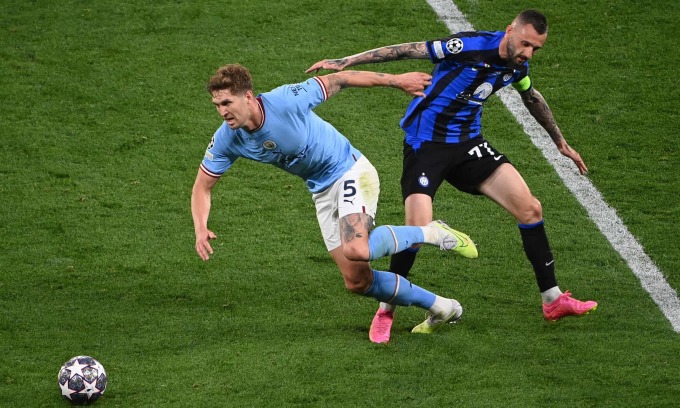
Stones dribbles past Inter captain Marcelo Brozovic during the Champions League final at the Ataturk Stadium in Istanbul, Turkey on June 10. Photo: EPA
By mid-February, Man City were having an underwhelming season by their own standards. There were questions, and rightly so, for all the jibes that followed, about Haaland’s impact on the club’s play. With limited involvement, touching the ball less than 30 times per game, how could the Norwegian contribute to the link-up play, the possession-based control that Guardiola favours? But Haaland was still a great goalscorer and a threat on the counter-attack.
To free Haaland from the pressure of having to touch the ball and maintain constant pressure around the opposition penalty area, Guardiola had to add a midfielder. The solution, which proved successful, was to use Stones in a “hybrid” role – playing at right-back but often cutting inside when Man City were in possession.
But the change created defensive problems against fast wingers and required a lot of adjustment. So it was still a risky strategy, despite Guardiola’s experimentation with Philipp Lahm and David Alaba at Bayern and Joao Cancelo at City. He then tweaked it, with Stones playing centre-back and then pushing forward from there to play alongside Rodri in the centre of midfield. City then went on to win the Premier League title, successfully defending the title, winning the FA Cup and reaching the Champions League final.
However, in the Champions League final at the Ataturk Stadium in Istanbul, Türkiye on June 10, Inter played with a pair of strikers. If they continued to push forward, Stones could have isolated Ruben Dias against the duo of Lautaro Martinez and Edin Dzeko, and then Romelu Lukaku in the second half. So Guardiola went back to his original solution - Stones starting at right-back, meaning Kyle Walker would be on the bench, Manuel Akanji would partner Dias at centre-back and Nathan Ake would occupy the left wing.
There was a heart-stopping moment in the 12th minute when Nicolo Barella broke through, but Federico Dimarco could not get forward quickly enough to exploit the space on City’s right flank. But this was a calculated risk for Guardiola. Dimarco does not have the pace of Real’s Vinicius in the semi-finals or Bayern’s Leroy Sane in the quarter-finals, and cannot venture forward because he has to keep up with Bernardo Silva. This allows Stones to drift more freely into the middle.
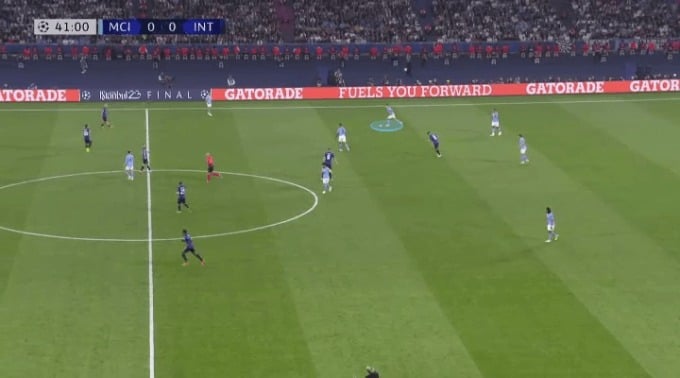
A typical example of Stones' style of play in the Champions League final. He started as a right-back, holding the ball...
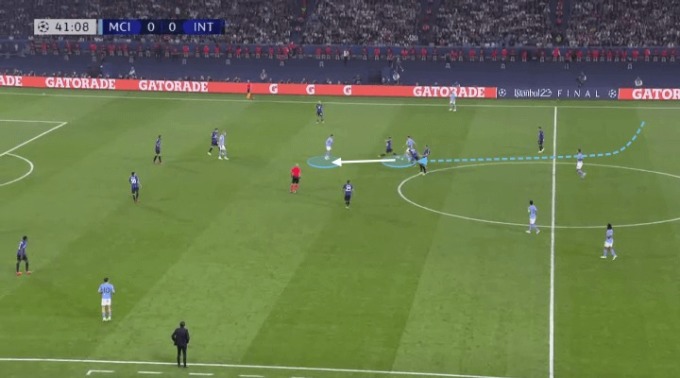
... then advanced past half the field, turning into the middle to coordinate with teammates like a central midfielder. Photo: screenshot
In this way, Stones was the freest Man City player. At times, the Englishman would appear on the left flank, pass inside the centre, then run diagonally across the pitch and receive the ball on the right. Early in the second half, Stones found space in the Inter half, pressing close to the box but failing to finish. In his 82 minutes on the pitch, Stones completed all six of his dribbles against Inter - a tally only bettered by Lionel Messi, who made 10 against Juventus in the 2015 final.
Stones thrived in his new role as a libero, a free-flowing defender who was nicknamed the ‘Barnsley Beckenbauer’. It was a clear demonstration of the view put forward by the late Jack Charlton, a member of England’s 1966 World Cup-winning squad, in 1994 that, tactically, the full-back was the most important player on the pitch, with the freedom to dictate the outcome of the game.
According to the Guardian , Stones brought a sense of solidity and authority to Man City, especially after Kevin De Bruyne left the field due to injury. Perhaps it was no coincidence that the close-range header missed by Romelu Lukaku in the 88th minute and Robin Gosens' finish saved by goalkeeper Ederson in the final seconds of stoppage time only came after Stones had been replaced by Walker.
The final on 10 June was a match where everything went smoothly for Man City. Akanji - an underrated but hugely important signing - initiated the decisive goal with a through ball for Bernardo Silva to break into the penalty area from the right side of central defence, the position Stones usually occupies. Stones was also involved in the situation, but was moving as a right-back. "Sometimes fate helps to adjust tactics," the Guardian commented on this detail.
Stones was one of the first signings of Guardiola’s Man City era, but his future at the Etihad Stadium has been questioned many times. Unlike other traditional English centre-backs, Stones is highly regarded for his ability to hold the ball up and escape pressure. Even Guardiola, who favours centre-backs with this ability, seemed to lose faith in the nearly $60 million contract.
In the 2019-2020 and 2021-2022 seasons, the 1994-born centre-back only started 12 Premier League matches, and was a substitute at the beginning of the season. The turning point came when Guardiola sent Cancelo to Bayern on loan, then tested Stones in a new role.
At 29, Stones seems to have found his best position at Man City, as a versatile defender who can play on the right wing and as a deep-lying playmaker, and is also good in the air. After the 2022-2023 Champions League final, Guardiola put his arm around his student and walked to the stands where Man City fans were to celebrate.
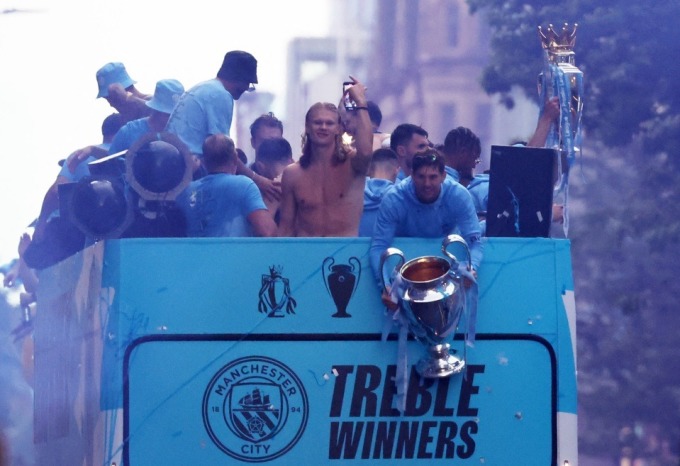
Stones holds the Champions League trophy at the front of the open-top bus carrying Man City players parading through the streets of Manchester, England, celebrating winning three major titles on June 12. Photo: Reuters
"Some tactical adjustments don't come from overthinking, but sometimes they are necessary changes. Like Stones at Man City this season, Guardiola has finally reaped the rewards," commented the Guardian .
Hong Duy (according to Guardian )
Source link




![[Photo] Journalists moved to tears at the Memorial Service for the soldiers who died in Gac Ma](https://vphoto.vietnam.vn/thumb/1200x675/vietnam/resource/IMAGE/2025/5/30/9454613a55c54c16bf8c0efa51883456)
![[Photo] A delegation of 100 journalists from the Vietnam Journalists Association visits the soldiers and people of Truong Sa island district.](https://vphoto.vietnam.vn/thumb/1200x675/vietnam/resource/IMAGE/2025/5/30/0984a986227d4e988177f560d2e1563e)
![[Photo] Prime Minister Pham Minh Chinh attends the event "Digital transformation of the banking industry by 2025"](https://vphoto.vietnam.vn/thumb/1200x675/vietnam/resource/IMAGE/2025/5/29/0e34cc7261d74e26b7f87cadff763eae)





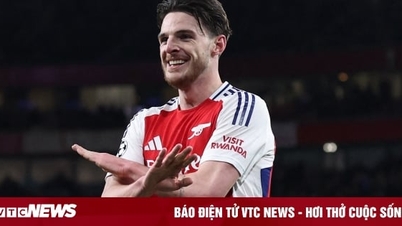

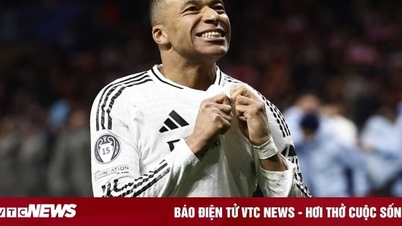

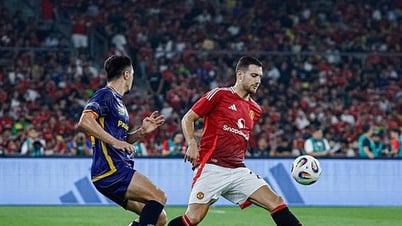

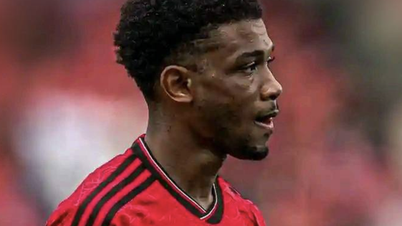


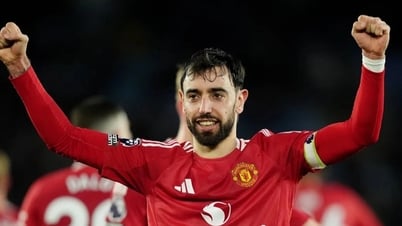


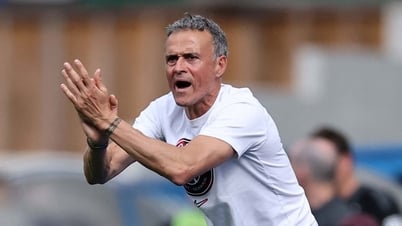













































































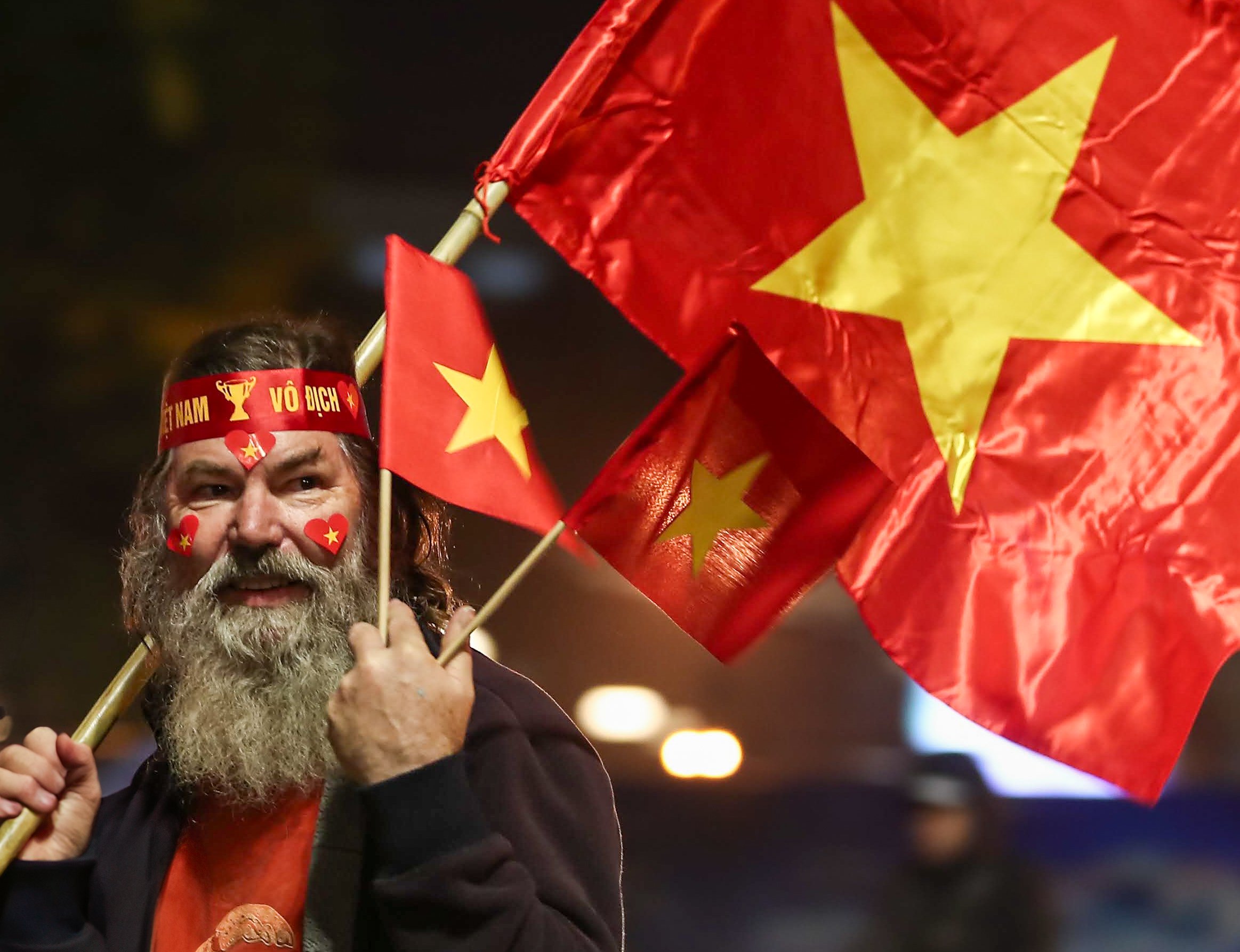



Comment (0)